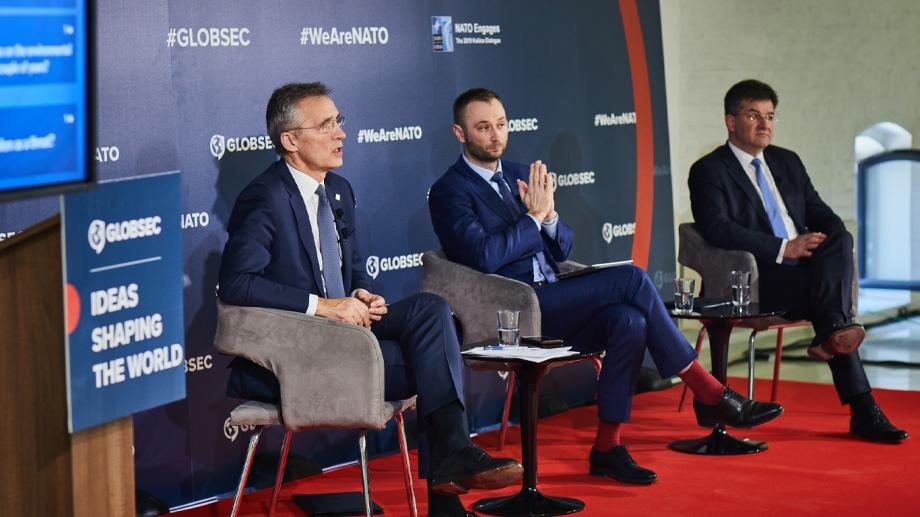NATO Secretary General reminds key success of NATO at a GLOBSEC Debate in Košice, Slovakia, 28 February 2019

NATO is the most successful Alliance in history, NATO Secretary General Jens Stoltenberg highlighted at the GLOBSEC organised debate with students and young leaders in Košice. The debate was happening on the sidelines of the summit meeting of NATO Eastern flank members known as Bucharest Nine (B9). Slovak Minister of Foreign and European Affairs Miroslav Lajčák also took part as a speaker at the discussion.
For 70 years now Allied countries have been able to stand together, united around the principle “one for all and all for one” and overcome the differences among them, NATO Secretary General explained the main reason why the Alliance has been so successful so far. “The other main reason is our ability to change, when the world is changing”, he added pointing to the major shift in the focus of NATO from deterring the Soviet Union during the Cold War to out-of-area operations aimed at ending the conflict in the Balkans and fighting terrorism in Afghanistan and Iraq in the decades after the Cold War ended.
After the events of 2014, when Russia illegally annexed Crimea and used its own force to stir up conflict in the East of Ukraine, NATO had started to refocus again on the territorial defence of its members. This time it concerns mostly new member states in the Eastern flank like Poland and Romania but especially the three Baltic states, which were once involuntary members of Soviet Union and are now the most vulnerable NATO Allies facing new Russian adverse posture.
The key decision was made at NATO Summit in Warsaw in 2016 where the Allied countries agreed to send multinational combat-ready battlegroups to actively support the defence of the Baltic states and Poland. “We have to make sure that nothing like what we have seen in Georgia or in Crimea or Donbass can happen to any NATO Ally”, NATO Secretary General explained the reasons for boosting the deterrence of these Eastern members. Minister Lajčák added that Slovak soldiers also take part in NATO mission in the Baltics because the Baltic States requested their presence. “It is not that NATO enforced itself upon those countries” he stressed out addressing the disinformation that’s been lately present in Slovakia.
Countering disinformation featured significantly in the discussion. Mr Stoltenberg explained the basic approach of NATO: The answer to propaganda or disinformation is not more propaganda or more disinformation but the facts, the truth, because in the long run, the truth will prevail. He added that that the best way to deal with disinformation is to have free and independent media. Minister Lajčák elaborated on the specific voices supported by disinformation in Slovakia questioning the NATO and the EU membership. “With NATO, we have guarantees of security and peace. With the European Union, we have guarantees of prosperity and protection of our human rights, there are no better alternatives,” he stressed.
Questions raised by the audience addressed also the issue of defence spending by various NATO members. NATO Secretary General recalled his conversations with the U.S. President Trump during which he presented significant increases in defence spending of European Allies and Canada. “President Trump is now clear about that NATO is no longer obsolete. NATO is important for Europe, but it is also extremely important for the United States.” Minister Lajčák was quite blunt about the European NATO members, including Slovakia, not meeting their commitments which they had voluntarily accepted: “It’s like a free ride and that is not fair. If you order a taxi you also pay your bill.”
The discussion with students and young leaders was wrapped up by the questions about Ukraine and its future relations with NATO. SG Stoltenberg has made it very clear that there are no doubts among the Allies about Russian presence in Ukraine and its support to separatists in Donbass. He also emphasized that every nation has the right to decide its own path and NATO totally respects any such decision. If Ukrainians wish to become a part of NATO it is a question for NATO members and Ukraine to decide. No-one else has the right to interfere.